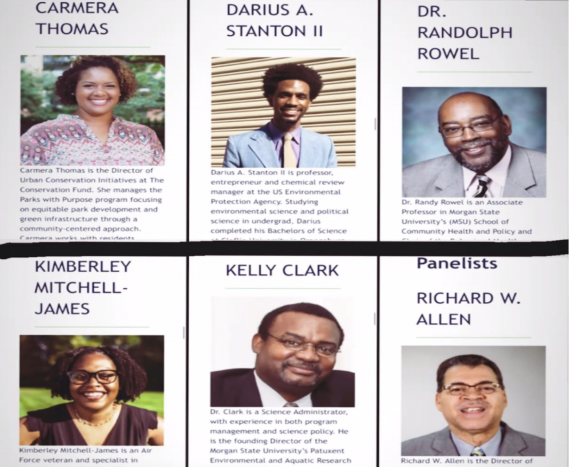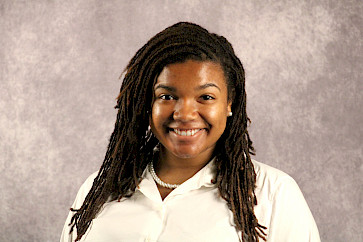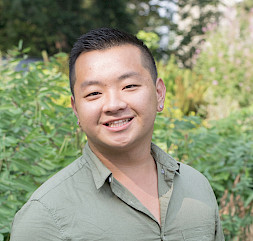What's Missing, and Getting There: Diversity and the Chesapeake Bay
Lawren Caldwell and Pheej Lauj (Pheng Lor) ·The 2022 Chesapeake Community Research Symposium held between June 6–8 brought together a diverse selection of educators, scientists, and community members. The symposium was bounteous with research presentations and dialogue surrounding the Chesapeake Bay, as well as discussions on maintaining positive momentum with the ever-changing human and natural environments.

The symposium consisted of several workshop sessions and panel discussions that varied from the natural sciences to the social sciences. A notable panel, titled “The State of Diversity in Chesapeake Bay Restoration Efforts: A discussion on the need for more diversity in the environment movement and how to facilitate positive outcomes” consisted of six African American panelists from a variety of career backgrounds ranging from professors, directors of organizations, and the military. Throughout the panel presentation, they highlighted the importance of creating space for inclusion in the conservation and environmental fields, and the need for voices and representation of underrepresented communities and professionals.
“We are going to teach you how we do things and you need to assimilate.” - Panelist
Diversity, equity, and inclusion (DEI) refers to the presence of differences (race, religion, sexual orientation, ethnicity, nationality, socioeconomic status), the promotion of impartiality and fairness, and the act of ensuring those from different backgrounds feel welcomed and involved. The six panelists, Richard W. Allen, Dr. Kelly Clark, Kimberly Michell-James, Dr. Randolph Rowel, Professor Darius A. Stanton II, and Carmera Thomas touched on several topics that correlate to the lack of diversity and inclusion seen within environmental efforts.
One panelist addresses the significance of DEI or environmental justice efforts, and how it can change a predominantly and historically white and environmentally racist field. He shared that a common association entering a place of such structure and history can lead to a mindset of one needing to acculturate or assimilate – highlighting the lack of settings and work places that are aware of cultural and demographic differences. From a Bay Journal article:
“Similar trends permeate the nonprofit sector. A 2019 survey of staff representing more than 100 environmental groups in the Bay watershed found that less than 20% of respondents believed their boards and senior managers reflected the region’s diversity. Only about a quarter thought their organization had proper diversity training.”
DEI or equity, inclusion, and justice (EIJ) movements in recent years have not only gained traction across the nation, and beyond, for organized groups and employers to assess equitable and inclusion practices, as well as reflect on the need for intentional diversity recruitment of staff. Challenges of equitable representation involving the environment and climate initiatives and affairs are not foreign, this panel discussion served as a mere reminder for the larger Chesapeake Bay and watershed community.
Is funding prioritized for diversity, equity, and inclusion efforts in the workplace? Are senior and executive staff, board members, talking and acting on DEI or EIJ investment and change?
From a fiscal standpoint, the panels discussed the need for exploring the ways in which DEI efforts can be made a priority through funding. A notable mention addressed leadership, such as those in senior or executive roles or those serving on boards, and recommended a commitment to funding and carving out time to strategize and invest in such DEI efforts. Intentional funding, agreed among panelists, can be a start to addressing a structural and systemic change for DEI efforts.
An example which can resemble this is the Global Sustainability Scholars (GSS) Program, funded by the National Science Foundation (NSF). The GSS program that aims to serve underrepresented undergraduate and graduate scholars in the sustainability and STEM fields. By matching academic scholars with leading scientists and researchers on global critical sustainability issues, the program addresses such opportunity gaps, in hopes to advance a more accurate reflection of communities facing climate and environmental impact and to advance equity challenges.

Group photo of Global Sustainability Scholars and Fellows. Photo by Bill Dennison.
Another take away from the panel is the importance of targeting workplaces and addressing the need for bias training workshops for staff members. A lack of workplace diversity directly influences the lack of understanding work colleagues and environmental leaders have towards the melting pot of communities that fields are recently noticing. Panel discussion also extended to the topic of strategic leverage and reach. Conveyed was the potential for BIPOC in leadership positions to be able to represent and advocate for unique community needs, which often go unrecognized.
A need for a behavioral shift for grantors to make funding accessible. The need to address resistance to social science and justice-based approaches to science, research, and funding.
Leadership plays a large role in advancing DEI progress, or simply addressing it. Representation within a workforce can be the start of progress for diversity, equity, inclusion, and justice measures. A takeaway from this panel discussion stressed structural and cultural shift through leadership, executive and senior staff, including the board, need to hold such DEI priorities beyond stating or simply repeating them as "priorities.” It is crucial for those in leadership positions to understand the importance of demographic diversity, cultural humility, and how that shapes a workforce encompassing complex systems such as natural and human environments and interactions.
Gaining a better understanding of how climate and environmental change impacts residents along the Chesapeake Bay will help natural scientists better understand the methods necessary to move towards a more holistic approach to addressing the bay’s ecosystem health and interactions. By setting intentional engagement goals and investing in diverse community representation, this can in turn reflect a more accurate depiction and potential for deeper community reach and engagement with all Chesapeake Bay restoration efforts.
From Lawren Caldwell, co-author of this blog and as an African-American scholar:
When I walk into a conference room, it is a rare sight to see someone who resembles my racial demographic. In turn, I am overcome with a sense of alienation and isolation. Unfortunately, I feel this way at most conferences related to the natural sciences. It is easy for me to get overwhelmed and to feel singled out as the underrepresented population. With representation comes a sense of community and comfortability. Observing the diverse selection of panelists helped to create an atmosphere that made me feel accepted, thus making me believe this is the start to a future where representation and inclusion are present.
References
- Chesapeake Community Research Symposium 2022 home. CRS2022. (2022, June). Retrieved June 2022, from https://ccmp2022.chesapeake.org/
- Cox, J. (2020, July 21). Chesapeake restoration under scrutiny for lack of diversity. Bay Journal. Retrieved June 23, 2022, from https://www.bayjournal.com/news/people/chesapeake-restoration-under-scrutiny-for-lack-of-diversity/article_4054be30-cab1-11ea-906c-370e2458b13a.html
- Diversity, equity, and inclusion. Diversity, Equity and Inclusion. (n.d.). Retrieved June 22, 2022, from https://dei.extension.org/
- Environmental justice, more than just a check mark. Chesapeake Bay Foundation. (n.d.). Retrieved June 23, 2022, from https://www.cbf.org/blogs/save-the-bay/2021/10/environmental-justice-more-than-just-a-check-mark.html
- Global sustainability scholars. Global Sustainability Scholars. (n.d.). Retrieved June 22, 2022, from https://www.gsscholar.org/
Blog written by: Lawren Caldwell and Pheej Lauj (Pheng Lor)

Lawren is a Global Sustainability Scholar working alongside UMCES and IAN staff on the Coastal Ocean Assessment for Sustainability and Transformation (COAST Card) project. Her passions include advocating for marginalized communities affected by environmental disparities and increasing minority representation within the natural sciences. She is pursuing her baccalaureate at North Carolina A&T State University studying Agricultural and Environmental Systems with a concentration in Environmental Studies.

Pheej is a Global Sustainability Fellow and is working on the transnational Coastal Ocean Assessment for Sustainability and Transformation (COAST Card) project. Pheej’s background includes zero waste and plastics reduction advocacy, advancing climate and organizational equity, and multicultural engagement. He is a community educator and advocate, and has worked with low-income and first-generation youth and families as a TRIO college advisor and crew leader for the U.S. Forest Service and MobilizeGreen. Pheej earned his B.S. in Environmental Health and Equity at University of California, Berkeley, and is pursuing his M.S. in Environmental Humanities at the University of Utah.

